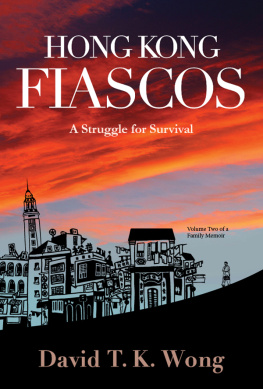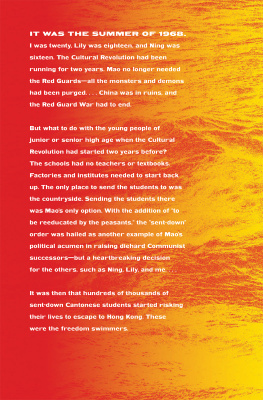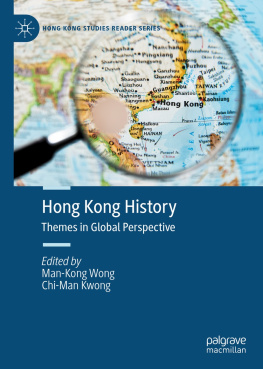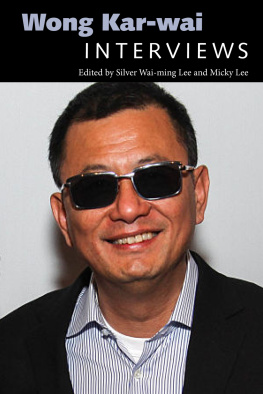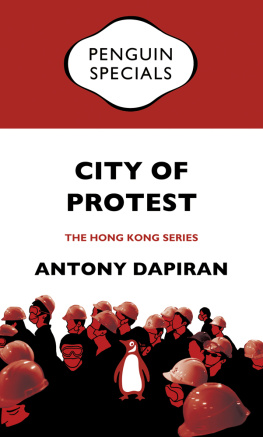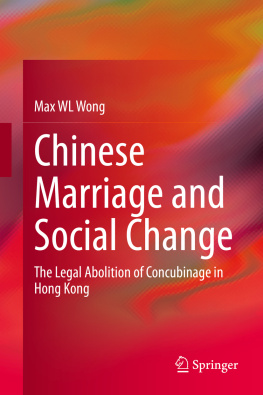
Copyright 2015 by David T. K. Wong
All rights reserved.
Published in Singapore by Epigram Books.
www.epigrambooks.sg
National Library Board, Singapore
Cataloguing-in-Publication Data
Wong, David T. K., author.
Hong Kong Fiascos: A Struggle for Survival /
David T. K. Wong
Singapore: Epigram Books, 2015.
pages cm
ISBN: 978-981-4655-56-9 (paperback)
ISBN: 978-981-4655-57-6 (ebook)
1. Wong, David T. K. Childhood and youth.
2. Authors, English Hong Kong Biography.
3. Singapore History 20th century.
I. Title.
PR6123
823.92dc23 OCN904741104
First Edition: October 2015
Contents
CHAPTER 1
Canton Reunion
CHAPTER 2
Down and Out in Hong Kong
CHAPTER 3
A Reluctant Journalist
CHAPTER 4
Destination America
CHAPTER 5
Land of the Free
CHAPTER 6
Home to Disasters
CHAPTER 7
Illusions Shattered
CHAPTER 8
Trial By Marriage
CHAPTER 9
A Bureaucrat in the Making
CHAPTER 10
Heart of the Beast
CHAPTER 11
Other Places, Other Lives
CHAPTER 12
Learning the Ropes
CHAPTER 13
Lessons Learnt
CHAPTER 14
My Brother Francis
CHAPTER 15
Sir John Cowperthwaite
Introduction
IT WAS LORD Byron, I believe, who had once observed that truth was very strange, always stranger than fiction. The more I became acquainted with the lives of others, the more I saw that Byron was on to something. Take the bohemian life of Katherine Mansfield, for instance. She met a singing teacher at the age of 21, married him after three weeks and abandoned him the morning after the wedding. Or take the sexually mercurial Anas Nin, who confessed to telling so many lies that she kept cards of her lies in a lie box to keep them all straight.
When I started writing fiction full time after my second retirement in 1989, I knew my stories could never catch up with such realities. Nonetheless, I wanted to have a shot at that overwrought dream of my youth, of becoming a practitioner of the literary art.
So I began by submitting myself to a strict writing regime and adhering to it for more than two decades. I took it as a personal form of amusement, of the kind many educated Chinese indulged in during retirement. History is full of examples of scholars and former officials retreating to mountain huts to practise painting or calligraphy, compose poems or pluck upon string instruments. My father, for instance, took to writing poetry in his declining years. In the West, I imagine such people would be placed on a par with Sunday painters.
Although I had managed to complete a fair number of short stories and two novels over the years, and had the good fortune to get them all published, I never earned anything from them. It was true that decades earlier, when I was young and impoverished, I had accepted payments for two stories published in the Pacific Spectator in America and one from the Evening Standard in London. But thereafter all fees and royalties went to charities.
Now, if I were to write a story about a Hong Kong man working for decades without a monetary return, most readers would find such a tale highly implausible. But that was Byrons point; facts were often stranger than fiction. On that realisation, I decided in 2011, after the publication of my second novel, The Embrace of Harlots, to give up writing fiction. I had, in any case, exhausted most of the ideas I wanted expressed through that genre. Any more would have been sheer repetition.
That decision left me with the need for an alternative form of amusement. The established routine of writing seven days a week, from after breakfast till lunch time, had to be replaced. I had by chance settled upon three regular luncheon appointments each week, with different friends, after which I would visit doctors, dentists, barbers, bankers and assorted stores and supermarkets to stock up my larder. Once in a while, I would take in a play or a cinema. On the days without appointments, however, I would write after lunch as well.
An obvious alternative to writing would be to do more reading. But that was not feasible because I was already devoting my evenings to reading. Any more would overstrain my ageing eyes. And, at the age of 82, I was no longer capable of indulging in the more adventurous or taxing pastimes of my youth.
Thus I found myself at a loose end. I surrendered myself to desultory reminiscing and daydreaming. But one morning, I found myself humming Stephen Sondheims song from A Little Night Music.
Evry day a little death
On the lips and in the eyes,
In the movements, in the auses,
In the gestures, in the sighs,
Evry day a little dies.
That tune did not make me feel maudlin, however; far from it. I had long prepared for the inevitable and was actually quite relaxed about the prospect of meeting the Grim Reaper. I had suffered and survived pancreatic and other forms of cancer; so I had had a pretty good run for my money. I was curious to find out what Shakespeares undiscovered country from whose bourn no traveller returns had in store.
So thinking, I began meditating upon death. It occurred to me that the whole thing might turn out to be just one huge cosmic joke. Upon reaching that undiscovered country, one might well find the spirits of all the departed waiting there, breaking out in uproarious laughter at ones belated arrival and clapping their transparent hands on ones phantom shoulders. Or perhaps one might find confirmation of the Taoist notion of a return to the original Nothingness. In either case, it would be enormous fun to uncover definitively the answer to that ancient puzzle.
In line with that thinking, I began recalling, one by one, the many bosom friends, lovers and family members I had associated with over my long life. Some episodes had taken place under circumstances which were highly unlikely and, indeed, stranger than fiction. The people involved had nonetheless enriched me and deepened my understanding of life. Thinking about some of them made me yearn to share once again a drink, a meal or a companionable silence with them.
All of a sudden, I realised that most of them had departed and, with the passage of so many decades, I had turned into the sole keeper of their memories. When I slough off my mortal coils, there would be no one left to tell of their kindness, generosity, loving nature, helpfulness, patience and selflessness. For all their individual flaws and fortes, they had each lived life with dignity and splendour. It was then that I decided I had to write about them, in the hope of prolonging their existence a little beyond my own demise. I had no illusion that whatever I write would be just another barely noticeable speck tossed into that infinite river of Time.
But before I could write about them, I realised I had to provide a context. It meant explaining the circumstances under which they and I had behaved and interacted. That faced me with a number of issues. I had led a life that could not be regarded as exemplary. Moreover, I was by instinct and by the habits and genes of my ancestors a very private person. Yet, in explaining the circumstances of our interactions, I had to be forthright, detailing my unworthy deeds as well as those odd commendable ones. Otherwise, the whole narrative would lack the ring of truth.
Next page
